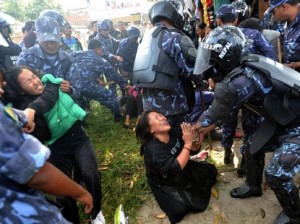As March passes, there is no sign of any lessening of the civil unrest within Chinese-occupied Tibet as this month has seen a number of arrests. March is considered a sensitive period by the Chinese government, due to both National Uprising Day on March 10, and March 14, which marks the fifth anniversary of the 2008 Lhasa uprisings. Existing Chinese security policies have been hardened with new strategies implemented leading to an increase in arrests and long sentences for Tibetans for even minor violations.
According to Chinese state news agency Xinhua, the police reported that after arrests in late February, the “…suspects were on the spot to take photos and send them abroad”. The five arrested have been blamed for “recruiting and encouraging” the self-immolation protests.
As National Uprising Day approached, a number of arrests were reported within both Tibet and China. On March 8, a demonstration conducted by three monks of the Yaso monastery in the Bathang region of Eastern Tibet was brought to an end when Chinese security personnel arrived on the scene. Although the demonstration was peaceful, authorities attempted to arrest the protestors. As one of the monks was taken away, the remaining two managed to escape and are currently on the run, their whereabouts is at time of writing unknown. The same day, a Tibetan sought by the police for more than a year was arrested in Sichuan. The Tibetan, wanted for his involvement in a protest last year, was arrested while visiting family members in the region.
During a raid the following night, a Tibetan monk from the Kirti monastery in the Ngaba County was arrested by the Chinese police. According to witnesses, the monk was taken away while nursing a relative at a nearby village. The relatives still don’t know the reasons behind his arrest and current whereabouts. On National Uprising Day itself, Chinese authorities arrested three monks who staged a demonstration in the Sichuan province. The monks, belonging to Mangey monastery, demanded freedom and democracy in Tibet. Moreover, two lay Tibetans that tried to intervene in the arrests were also taken away.
Chinese authorities however, have not only been cracking down on political gatherings. On March 13, Phayul reported that popular Tibetan singer Lo Lo had been sentenced to six years in prison for raising separatist sentiments in his politically charged songs. Lo Lo has been arrested before but was released again after a short detention.
As a means to restrict the flow of information and stopping the spread of “separatism”, Chinese authorities have conducted a major crackdown on mobile phones in Tibet in March. According to Dharamsala-based rights group Tibetan Centre for Human Rights and Democracy (TCHRD), a team of “experts on cellphone technology” arrived in the Tibetan capital on March 7. The following day, they initiated security sweeps of mobile phones in all of Lhasa’s major monasteries, where they are searching for sensitive, politically charged material in the form of images and writings. TCHRD said that the special search team are staying four to five days in each monastery as “local authorities have vowed to undertake severe measures including detention and imprisonment against attempts to share information about Tibet”. The rights group added that the view from Beijing is that “…one is a criminal if one tries to share information about human rights abuses in one’s country or community”. The Chinese crackdown on mobile phones follows the increased restrictions on news, media, and communications in Tibet, aimed at ensuring what Party Secretary Chen Quanguo of the Tibetan Autonomous Region last year called ‘absolute security of Tibet’s ideological and cultural realm”.
As this month comes to an end, the Chinese hardline-policy is strikingly clear as tighter policing of monasteries, controls on visits to Lhasa, surveillance on all forms of communication and arbitrary arrests of Tibetans voicing their resentment or even being related to self-immolators are all part of daily life in the Chinese-occupied country of Tibet.





 Print
Print Email
Email